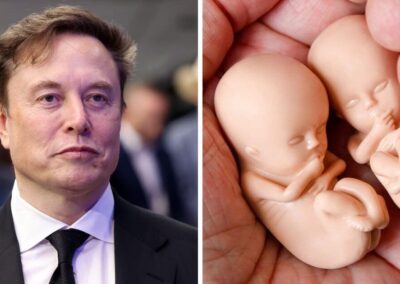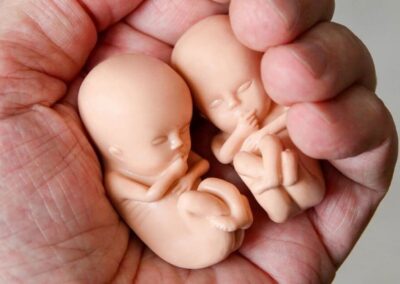A mother from Southampton has shared her experience of being told to abort one of her twin girls shortly after miscarrying the other.
Elaine Avery, 37, was excited to be having twins but was told at an early stage that hers was a high-risk pregnancy.
Her daughters, who she named Aurelia and Aurora, were monochorionic-diamniotic identical twins, which means they shared a placenta and therefore were at higher risks of complication such as low birth weight or premature birth. At 21 weeks, Elaine also found out that the twins had twin-to-twin transfusion syndrome, which means blood flow is not shared evenly between the two babies.
Elaine said “I had to undergo emergency surgery to separate the blood vessels connecting them. When they told me about the complications, I felt so scared and alone”.
She added “I had to keep going and stay strong for my babies, as there was a fighting chance everything would be okay”.
Elaine faced tragedy just a week later
Sadly, at just 22 weeks gestation, baby Aurelia passed away.
“I felt so blessed when I discovered that there were two babies growing inside me – but it wasn’t meant to be,” Elaine said. “I was devastated, but I couldn’t grieve Aurelia when Aurora still needed me”.
“I couldn’t believe it and I struggled to come to terms [with] losing my baby girl”.
Elaine continued to fight for her other daughter Aurora
Elaine and her surviving daughter were not out of the woods yet though. Elaine was told that Aurora had chronic lung disease and developmental delay, and therefore most likely would not survive.
“I wanted to hang onto the hope of my other baby, but I was advised to terminate the pregnancy entirely as there were too many issues present. But I didn’t want to face losing another child, so I went ahead and decided to carry her through to full-term”, she continued.
Only two weeks after Aurelia passed away at 24 weeks gestation, Elaine went to the early pregnancy unit as she felt something was not right. She was admitted and Aurora was born prematurely through emergency Caesarean section.
Elaine said “She seemed like she was fighting in there, so I fought with her”.
Aurora had to have multiple surgeries to combat sepsis, while Elaine and her family, including her 12-year-old son Max, mourned Aurelia at her funeral.
After months of care, Elaine’s “miracle” baby was able to thrive
Despite Aurora’s continued developmental delays, Elaine describes her as “feisty” and says she “loves to laugh”.
“She radiates joy and resilience and the bond with her older brother is the source for laughter and happiness within the entire family”.
Elaine also expressed her gratitude for the help she received during her challenging experience.
“I couldn’t have gotten through this without the support of my friends and family, as well as the doctors and nurses who cared for, and continue to care for Aurora”.
“I’m so proud of her and I know her sister would be too”.
The number of babies surviving from 22 to 24 weeks gestation is increasing
Aurora was around 22 weeks gestation when her sister Aurelia died and her mother Elaine was advised to have an abortion. A number of key studies in recent years have documented the improving outcomes for these extremely premature babies. A 2004 Swedish study found that neonatal survival outcomes between 22 and 25 weeks gestation significantly improve when neonatal hospital staff take a proactive approach in the care of premature babies.
A 2008 study based on a neonatal intensive care unit in London also found that neonatal survival rates at 22 and 23 weeks gestation had improved. In 1981-85, no babies who were born at these gestational ages survived to discharge. However, by 1986-90, 19% did and this increased to 54% in the period 1996-2000.
A study in 2022 found almost four out of five babies born prematurely between 22 and 28 weeks gestation survive to discharge from the hospital. It found that from 2013 to 2018, with infants born between 22 and 28 weeks gestation, “survival to discharge occurred in 78.3% and was significantly improved compared with a historical rate of 76.0% among infants born in 2008-2012”.
Spokesperson for Right To Life UK, Catherine Robinson, said “It is inspiring to hear about the courage of Elaine in fighting for her daughter’s life while mourning the loss of her other daughter. It’s very sad and deeply disturbing that medical professionals recommend ending the life of an unborn baby who has a difficult prognosis”.
“Thankfully, Elaine did not listen to the medical advice, and as a result baby Aurora is alive and happy today”.












